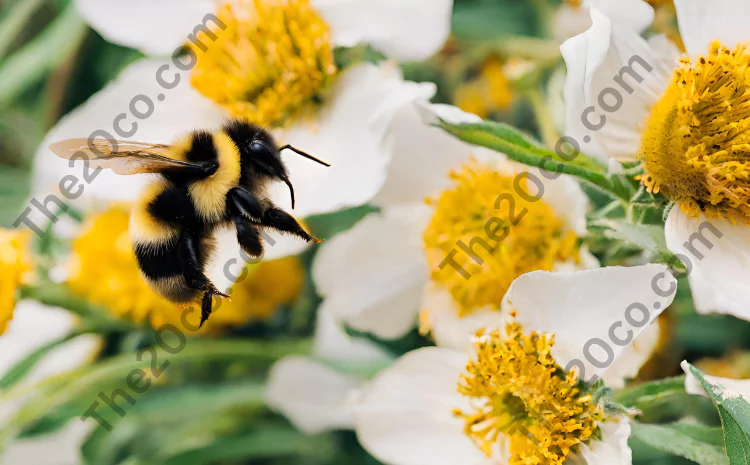Outdoor bumble bee nests and indoor infestations can be alarming. But there are effective methods for removing bumble bees without harming these vital pollinators or using harsh chemicals. This guide covers natural bumble bee deterrents plus humane removal tactics.
Key Takeaways
- Bumble bees are docile and rarely sting unless defending their nest. Avoid swatting at them.
- Natural repellents like mint, citronella, cedarwood, and lemongrass oils deter bees from lingering.
- Remove appealing flowers, cover trash cans, seal openings, and use fans to prevent nesting spots.
- At night, carefully seal nest entrances or use a bee vacuum to safely collect and relocate bees.
Understanding bumble bee behaviors and removing attractants can get rid of them without toxicity. Let’s explore smart, eco-friendly solutions!
Why Avoid Killing Bumble Bees?
While scary when swarming, bumble bees are extremely beneficial as prolific pollinators of crops and wild plants. Killing bees contributes to declining populations, which severely impacts ecosystems, agriculture, and our food supply.
Other reasons to avoid harming bumble bees:
- They have round, furry bodies with no honeycomb-shaped hives. Easily distinguished from more aggressive yellow jackets.
- Docile by nature, focusing on foraging – they do not generally attack or sting people without major nest disturbance.
- Non-aggressive bees like bumbles boost garden yields through extensive flower pollination.
So live and let buzz! Deterrents and humane removal tactics allow coexistence safely.
Effective Natural Bumble Bee Repellents
Certain natural scents chase bees away by maskingflower nectar smells they home in on. Safe DIYrepellent options include:
- Mint oil – Strongly deters bees. Spray pure mint oil diluted with water around unwanted areas. Grow mint plants.
- Citronella – Used in commercial bug sprays and candles. The lemony aroma repels bees. Use citronella essential oil or plants.
- Cedarwood – Its woodsy fragrance makes gardens and patios less enticing nesting spots. Use cedar mulch or essential oil.
- Lemongrass oil – Adds a pleasant lemony-herbal scent. Dilute with water to spray bee-prone zones.
- Cloves – Extremely potent and disliked by bees. Cloves or clove oil help block nest entry points.
Check that repellents won’t irritate kids, pets, wildlife, or plants before wide application. Target problem zones instead of blanket spraying.
Deterring Bumble Bee Nests
Preventing outdoor nests proactively is ideal. Reduce appealing sights, smells, and entry points:
- Remove flowering plants and fallen fruit that attract hungry bees.
- Cover trash cans securely – sweet residues lure bees.
- Seal openings like gaps under roofing, between bricks, or cracks in wood that provide nest access.
- Use fans near entry points – bees dislike strong airflow.
- Install window screen covers to block indoor entry.
- Use insect-deterring plants like lavender, catnip, and wormwood.
Vigilantly maintaining your property minimizes needs for reactive nest removal later.
Safe Bumble Bee Nest Removal Methods
If bumble bees persist in settling around your home, gentle removal tactics include:
- At night, carefully seal nest entry points with caulk, expanding foam, wood, or metal screens. The colony will safely vacate over several days once unable to enter.
- Use a bee vacuum – specially designed vacuums safely collect bees alive into a chamber for relocation. Do at night when bees are less active.
- You can also hire a licensed beekeeper to handle removal and adopt the bees rather than eliminating them.
- As a last resort if bees pose an imminent threat, insecticide dust in nest entries kills them quickly but use extremely sparingly.
Avoid attempting removal in daytime when bees are buzzing about. Be patient over a week or more for them to fully vacate sealed nests.
Final Verdict
Humane bumble bee deterrents like cedar, mint, and citronella combined with sealing attractants allows coexisting safely. Trapping bees alive or blocking nest access enables bee-friendly removal. With proper extermination as a last resort only, you can enjoy outdoor living minus the swarming worries through gentle, natural solutions.

